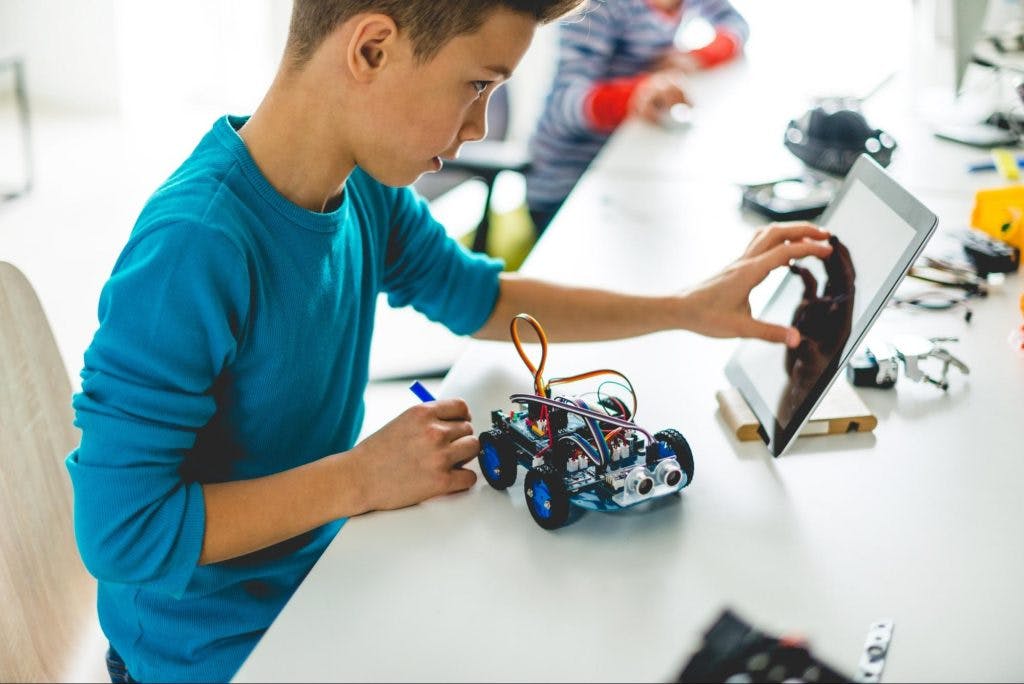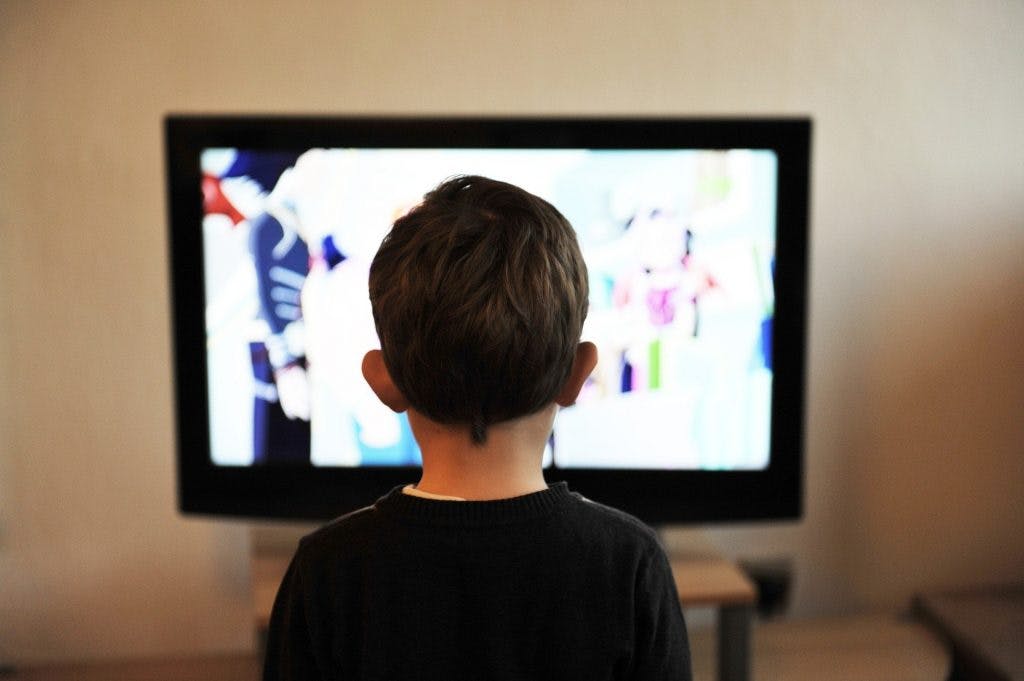Children and Technology: All Your Questions Answered
All Posts
Children and technology is a hot-button issue for parents everywhere. Most parents would tell you they know screen time should be limited, but the temptation to turn on the TV for a few minutes to get some quiet is often just too great.
(Can you relate?)
There’s ample opinions about how much screen time is too much, and the positive and negative effects of technology on children. It’s overwhelming, contradictory and frankly, a little confusing! is a hot-button issue for parents everywhere. Most parents would tell you they know screen time should be limited, but the temptation to turn on the TV for a few minutes to get some quiet is often just too great.
What are some positive effects of children using technology?

Good news first: it’s not a disaster if your children really like using your tablet. In fact, there can be many positive outcomes from childhood tech use.
1. Enhanced learning
Educational apps, online resources and educational television programming can all help children learn about all their favorite topics. Got a third grader obsessed with horses? Download an app about horse grooming, watch a child-friendly documentary, or encourage them to research different types of horses.
Plus, many teachers use educational technology to engage, motivate and personalize learning for students in the classroom. (In fact, one study found 75% of teachers say tech use in the classroom motivates children to learn!)
Speak to your child’s teacher and see if you can bring home any of the programs their class uses for a fun, educational screen experience.
2. Creativity and collaboration

Imaginative play is an essential part of childhood in every culture. With technology, children can learn new skills and create things in ways that were impossible just a couple of decades ago.
Using technology, children can:
- Animate videos
- Write and share stories
- Film and edit short movies
- Compose, record and mix songs
- Tour museums around the world virtually
The best part? Children can access communities to learn and share knowledge, show off what they’ve created and build friendships. They can create with their friend who lives down the street, or a family member on the other side of the world.
3. Building 21st century skills

Children have access to more information than ever before and are growing up with an innate understanding of how to use technology to learn, work and play.
You’ve definitely heard the term digital native thrown around, and with good reason -- children and technology are growing up together. Children are encountering tech in their classrooms, their homes, and the world around them.
It comes as no surprise that many companies actively seek out candidates with tech skills, and in some cases require them even for jobs that don’t explicitly work with technology.
With guidance and instruction, even young children can learn to use technology in a way that supports life after school. Children learn that technology is essential when they actively engage with knowledge-building games, programming and tech tools.
Does technology affect child development?
There’s no denying technology has an impact on child development. Passive tech use or overuse can have harmful side effects. But there are also proven benefits for children who use technology appropriately.
Children’s brains are squishy, elastic and constantly developing. In fact, one study has shown that our brains are 90% developed before the age of five. That’s why many parents and experts think technology and young children is a dangerous mix.
Here are some of the positive and negative ways technology affects child development:
1. Increased hand-eye coordination

Children and technology seem made for each other. We’ve all seen toddlers intuitively tapping away on a screen, playing an age-appropriate learning app with the ease of an adult tech user. According to the Association for Psychological Science:
“The variety, frequency and complexity of the contingent responses the child can get from tablets, smartphones and other touchscreen devices far exceeds anything a traditional physical toy can provide and may generate heightened levels of cognitive activity.”
That means age-appropriate apps can teach babies how to think and control fine motor functions (when they’re not chewing on the tablet, of course).
And it’s not just toddlers. Video games don’t turn your teenager’s brain to mush -- at least, not completely. Several studies have found that when older children play active video games, they’re building motor control, visual processing and attention skills. Video games may also improve:
- Spatial skills
- Working memory
- Ability to learn new tasks
2. Decreased time management skills
Technology is a time suck. How many of us have spent an embarrassing amount of time scrolling through our social media feeds, oblivious to the world around us?
If grown adults have trouble controlling their tech use, children and technology is an even stickier situation. Technology is inherently addictive, and it’s easy for kids to whine for just five more minutes before turning off the TV to go to bed.
Technology is designed to remove our sense of time and encourage us to spend more time in front of a screen. Our phones constantly interrupt us with notifications, new content and too-good-to-pass-up advertising. This lack of time management skills can bleed over into other areas of life, like bedtime, homework or family time.
How do you make sure this doesn’t happen to your children? Skip ahead to find out how a family media plan can set reasonable limit on tech use for your kids and you.
3. Improved learning outcomes

Educational games, television and apps all have the potential to boost learning outcomes, especially for younger children.
One recent study investigating the impact of literacy apps found that, when using literacy apps on an iPad, alphabet knowledge, print concepts and name-writing were significantly enhanced for preschool-aged children.
Even technology that involves parents in classroom learning can boost student achievement, since parental involvement in education is a major factor in student success!
4. Sedentary lifestyle
It’s no secret tech doesn’t exactly encourage children to stay active. Too much screen time has a whole host of physical consequences, including:
- Poor posture
- Weight gain
- Bad eyesight
According to the physical guideline for youth from the US Center for Disease Control and Prevention, children ages 6 to 17 should get at least an hour of moderate to vigorous physical activity every day.
It’s important to be intentional about setting screen time limits and encouraging imaginative, active play — even if it’s only to tire your children out before bedtime. Still want to stay connected? Try augmented-reality experiences on a family trip or use geocaching apps to turn a family walk into an adventure.

According to a report sponsored by UNICEF, technology helps children build social skills and maintain relationships. With social media and video chatting apps, children can connect with friends and build new, positive relationships.
Children use technology to build connections
In an increasingly global society, technology can connect children with friends and family members across the world. Skype, FaceTime, Facebook Messenger, Google Hangouts: they can all keep families and friends connected.
Want your 10-month-old daughter to meet her grandparents from Florida, but don’t want to get on a plane? They can babble away together from the comfort of your living room.
Digital portfolios and teacher-parent communication tools can also help you understand what your child is learning and reinforce it at home.
Technology may have a negative impact on childhood attention spans
According to Psychology Today author Jim Taylor, the internet doesn’t encourage attention. It’s inherently designed to distract, inhibit memory and not promote imagination when used passively.
Children are often split between activities when they’re using technology: watching TV and surfing the internet on a smartphone, poking at a tablet and doing homework at the kitchen table. This encourages shallow-level multitasking: when multitasking can improve ability to accomplish more than one monotonous task, but doesn’t encourage the deeper thinking needed for higher-paying jobs.
This can lead to problems when it comes time for children to put their smartphones down and focus on one-on-one interaction, family dinners, schoolwork or bedtime.
There’s no need to panic. In general, there isn’t enough conclusive research to support the idea that childhood technology use leads to attention disorders like ADHD. But making sure children take breaks and limiting background technology use is a good way to start building awareness around everyday tech use.
How do I make sure my child is using technology appropriately?
Here are six ways to monitor your child’s tech use and ensure they’re using it appropriately:
1. Keep screen time active

Effectively combining children and technology requires active engagement, so try giving your child education-focused programs or apps that encourage specific skills development.
According to a literature review examining past research into children and technology, screen time can be learning time for children if it prompts a response from children, and if parents can take the initiative to extend learning to their child’s real life experiences.
If you’re going on a family vacation, encourage your children to research your destination and think of fun activities they’d like to do with you. If you’ve just finished watching Frozen for the 10,000th time, give them the opportunity to animate their own short film or use a drawing app to make pictures of their favorite character.
With a little imagination and ingenuity, there’s no limit to what your children can actively explore using technology.
2. Introduce fun educational games they'll love
Do some research on engaging games that get kids excited to learn about the topics they’re most interested in, like Prodigy!
Prodigy is an online game that turns math learning into an epic adventure!
Kids create custom avatars they can use to explore new worlds, collect exotic pets, play with friends and complete quests. Along the way, they’ll answer math questions that build existing skills and teach them new ones, thanks to an adaptive algorithm.
Sign up for your free parent account to support your child’s learning with insights and reports.
3. Limit passive screen time
In contrast, parents should consider limiting their children’s passive screen time, especially for young children using technology.
Create a family media plan that clearly outlines acceptable technology use for everyone in your family. Work together with your children to clearly establish ground rules for everyday tech use.
#BacktoSchool time also means homework is back. Make sure digital devices aren’t distracting your children from homework. Create a Family Media Plan from @AmerAcadPeds today: https://t.co/MovpDpLWb6 pic.twitter.com/A6CF3I5B16
— American Academy of Pediatrics (@AmerAcadPeds) August 19, 2019
Here are some tips to get you started:
- Keep background TV off
- Set limits for screen time or internet use, if necessary
- Create tech-free zones like the bedroom or dinner table
Every family is unique, and what works for someone else might not work for you. Sit down together and talk about what kind of activities you’d like to prioritize, and involve your children to help them understand the importance of measured technology use.
4. Co-watch with your children

Engage with children as they watch TV and play educational or video games with them. Ask them about what they’re doing with their devices to boost the positive effects of childhood technology use.
According to the US Department of Education,
“Most research on children’s media usage shows that children learn more from content when parents or early educators watch and interact with children, encouraging them to make real-world connections to what they are viewing both while they are viewing and afterward.”
Sites like Common Sense Media also provide you with trusted reviews from experts and other parents on the appropriateness, effectiveness and engagement of hundreds of fun and educational apps.
Plus, you might even have fun!
5. Have the safety talk
“Don’t talk to strangers” is just as relevant today as when your parents taught it to you as a child. But now children have a whole other environment in which to worry about safety. Sit down with your children and remind them to:
- Keep personal information private
- Be critical about online advertising
- Be mindful of the potential for in-app purchases
- Stay safe when interacting with online users they don’t know
Even young children should understand the value of privacy and the potential dangers of the internet-- not to scare them, but to keep them safe and aware.
6. Be a role model

If you’re constantly on your phone or device and ignoring the world around you, why should you expect your children to behave any differently?
Show your children the value of putting your phone away during conversations and being fully present. Take children to the park, build a fort in the living room or have your own healthy habits to encourage active and imaginative play.
According to Jessica Dauw, researcher and ECSE teacher, “the environment in which children are using screen media and the content they are exposed to plays more of a role in children’s developmental outcomes.”
You’re not supposed to be perfect, but actively modeling good behavior for your children can go a long way.
Final thoughts: Children and technology
Phew. That was a lot. It’s true.
Technology is definitely having an impact on your child’s life, health and development. Thankfully, it’s not always a negative impact!
Be mindful of how children and technology interact in your home, and engage with your children to develop healthy, lifelong habits. They’ll be better equipped for a future where being technologically savvy isn’t a bonus — it’s a requirement.
It’s important to remember a lot of research to date has focused on the negative outcomes of childhood technology use. While you should be aware of the risks and take steps to avoid them, teaching your children to use technology in a positive way will impact them for the rest of their lives.
What are some of your tips when it comes to children and technology? Leave your response in the comments!
Prodigy is an adaptive math platform that can help you turn screen time into education time.
Join today to see why more than 100 million teachers, students and parents use Prodigy!




Does technology affect children's social skills?